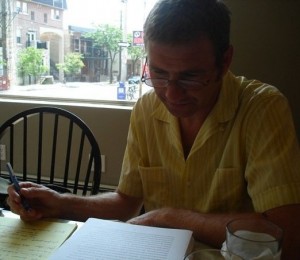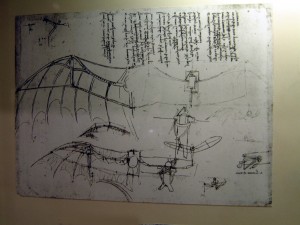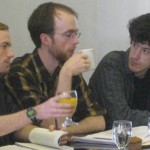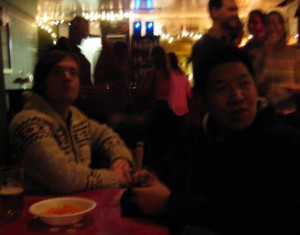 The great shift from ancient to modern science is the shift from observation to experiment. Aristotle, in the 4th Century BC, was an amazingly insightful observer of the natural world, and his work is exemplary of the science that cultivates a knowledge of the forms in which the world naturally presents itself. The great scientists of the Early Modern period, however, weren’t interested in learning about the given forms in which nature occurs; on the contrary, their goal was to learn how to harness the power behind those forms in order to bring about results of their own devising. In order to determine these driving forces, they developed the experimental method.
The great shift from ancient to modern science is the shift from observation to experiment. Aristotle, in the 4th Century BC, was an amazingly insightful observer of the natural world, and his work is exemplary of the science that cultivates a knowledge of the forms in which the world naturally presents itself. The great scientists of the Early Modern period, however, weren’t interested in learning about the given forms in which nature occurs; on the contrary, their goal was to learn how to harness the power behind those forms in order to bring about results of their own devising. In order to determine these driving forces, they developed the experimental method.
 Experimental method is not primarily a matter of going out and looking at what is there. On the contrary, experimental method, as the philosopher René Descartes explained in the 17th Century, is primarily done “in here,” planning something in the mind. The work of experiment is to design a precise procedure to isolate an exact result that will answer a question that is precisely defined in advance. The experimental scientist has something she wants to find out, and her task is first to work out a bit of reasoning and then to set up an apparatus that reflects that reasoning so that she can perform a procedure on a specified bit of nature and get an answer—at what temperature does it boil? how much does the precipitate weigh? how many millilitres of acid are needed to make the liquid change colour? The experimental scientist still observes, but the relevant observation is the simple and final result of the process—and the observation is not seen for its own sake, but to see what it has to say about the question that the scientist initially brought to bear on the situation: “since it’s green, it must be sodium.”
Experimental method is not primarily a matter of going out and looking at what is there. On the contrary, experimental method, as the philosopher René Descartes explained in the 17th Century, is primarily done “in here,” planning something in the mind. The work of experiment is to design a precise procedure to isolate an exact result that will answer a question that is precisely defined in advance. The experimental scientist has something she wants to find out, and her task is first to work out a bit of reasoning and then to set up an apparatus that reflects that reasoning so that she can perform a procedure on a specified bit of nature and get an answer—at what temperature does it boil? how much does the precipitate weigh? how many millilitres of acid are needed to make the liquid change colour? The experimental scientist still observes, but the relevant observation is the simple and final result of the process—and the observation is not seen for its own sake, but to see what it has to say about the question that the scientist initially brought to bear on the situation: “since it’s green, it must be sodium.”
 There are no doubt many good reasons to be critical of adopting modern science as our norm for knowledge. Most obviously, this “science”—the Latin word that simply means “knowledge”—is not concerned with apprehending what is there, which is our typical sense of what “knowledge” is, but with figuring out what are the routes of access into things for the sake of taking advantage of them. The goal of modern “science” is not truth, but, as Francis Bacon, the British spy, expressed it clearly in the 16th Century, power. Generally, we don’t think of “knowing how to take advantage of something” as proper knowledge of the thing—generally, on the contrary, we think of proper knowledge of the thing as a sympathetic appreciation of its inherent nature. The destructive impact of relying on this “inquisitorial” model of modern science is evident in many areas of life, but most obviously in the progressive destroying of our natural habitat that is the result of approaching nature as something to be exploited rather than as something to be understood.
There are no doubt many good reasons to be critical of adopting modern science as our norm for knowledge. Most obviously, this “science”—the Latin word that simply means “knowledge”—is not concerned with apprehending what is there, which is our typical sense of what “knowledge” is, but with figuring out what are the routes of access into things for the sake of taking advantage of them. The goal of modern “science” is not truth, but, as Francis Bacon, the British spy, expressed it clearly in the 16th Century, power. Generally, we don’t think of “knowing how to take advantage of something” as proper knowledge of the thing—generally, on the contrary, we think of proper knowledge of the thing as a sympathetic appreciation of its inherent nature. The destructive impact of relying on this “inquisitorial” model of modern science is evident in many areas of life, but most obviously in the progressive destroying of our natural habitat that is the result of approaching nature as something to be exploited rather than as something to be understood.
What is nonetheless exciting about this modern method is its recognition that what shows itself in the apparently simple observation that, for example, a liquid is yellow, is something powerfully communicative of deeper matters of great concern to us. Through the simplest immediacy, great complexity is transmitted.
 As the simple fact that a liquid is yellow can, in the appropriate circumstances, reveal that an important chemical transformation has in fact happened, allowing the scientist to conclude, therefore, that a particular chemical is present in the rock, which in turn indicates that there was organic matter at that level of drilling, which means, finally, that there will be oil found if one drills there, so can the fact that you rolled your eyes that way indicate that you really were not sincere in your expression of interest in my view, revealing yet more deeply that your level of respect for me is significantly lower than you claim it to be.
As the simple fact that a liquid is yellow can, in the appropriate circumstances, reveal that an important chemical transformation has in fact happened, allowing the scientist to conclude, therefore, that a particular chemical is present in the rock, which in turn indicates that there was organic matter at that level of drilling, which means, finally, that there will be oil found if one drills there, so can the fact that you rolled your eyes that way indicate that you really were not sincere in your expression of interest in my view, revealing yet more deeply that your level of respect for me is significantly lower than you claim it to be.
This is not just a matter of what we reveal about ourselves though seemingly trivial bits of behaviour, (though that is a very important matter). This revelation of deep complexity through sensory simplicity is the core structure of our meaningful inhabitation of the world.
 Though it might seem that I am simply here, now, my presence is really an elaborate carrying on of a vast history of developed significance. When I sit in the coffee shop, I feel at home. This “homey” feeling of belonging is what draws me here, but this sense of belonging is not part of the simple sensory immediacy of the material setting but is the way I have established a history of relating to this place and its denizens. Now, while I sit, I work on a writing project, itself meaningful because it is something I have been engaged in for weeks, and that engagement is itself meaningful in turn because of the network of personal, interpersonal and professional threads that are woven together in it. The simple immediacy of “here” and “now” are always inherently mediated by the complex past that we retain through them and the rich future they allow us to anticipate.
Though it might seem that I am simply here, now, my presence is really an elaborate carrying on of a vast history of developed significance. When I sit in the coffee shop, I feel at home. This “homey” feeling of belonging is what draws me here, but this sense of belonging is not part of the simple sensory immediacy of the material setting but is the way I have established a history of relating to this place and its denizens. Now, while I sit, I work on a writing project, itself meaningful because it is something I have been engaged in for weeks, and that engagement is itself meaningful in turn because of the network of personal, interpersonal and professional threads that are woven together in it. The simple immediacy of “here” and “now” are always inherently mediated by the complex past that we retain through them and the rich future they allow us to anticipate.
And this, perhaps, allows us to reflect again on modern scientific method. What we should remember about modern science is that it, too, is not just a simple and innocent “immediacy,” but is itself the vehicle through which a particular project of relating to the world is carried on. What we need to ask is whether the attitude toward the world implicit in this “science” is adequately respectful of the human world from which it originates.


 Participants in these
seminars consistently have the experience of growth in their conversation and
conceptual abilities, and typically leave with a transformed sense of the nature
and possibilities of philosophy.
Participants in these
seminars consistently have the experience of growth in their conversation and
conceptual abilities, and typically leave with a transformed sense of the nature
and possibilities of philosophy.





2 Comments
This is a very interesting post. I especially like that you discuss how the method of experimental science is expressive of our “meaningful inhabitation of the world,” as you put it. What came to mind as I was reading this is that modern science’s preference for power and manipulation over truth introduces the further issues of possession and authority as modes of “meaningful inhabitation.” If I look at something to determine what it can do for me, rather than allowing it to reveal itself, I make a claim on it, and in doing so I also implicitly assert my authority to make this claim. This is a common and destructive attitude towards natural resources, in part because it demands another claim to authority to counter it, as opposed to actually engaging with the truth (hence the frustratingly hopeless political debates surrounding environmental crises).
There is a distinction, though, to be made between the pure and applied sciences.
Applied sciences, yes, are often the hijacking of pure scientific method by self-serving concerns for material or political gain. Something similar might be said of philosophy. Nietzsche’s work, for example, was hijacked and manipulated by the Nazis to rationalize the questionable ethics of their sociopolitical agenda. Where the pursuit of knowledge is changing, is largely in the advancement of our capacity to apply it and with that advancement, comes the danger of that application becoming increasingly misguided.
Science will help to produce a fantastic military aircraft. Pay no mind, though, to the man behind the curtain, the questionable ethics of its intended application. Focus instead on what a terrific machine your tax dollars can produce.
The answers to this would seem to be mindfulness and vigilance. This is where the apparent decline in proportional support of study in humanities becomes dangerously unfortunate.